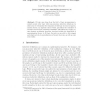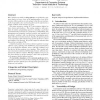200 search results - page 14 / 40 » Modular Reasoning in Object-Oriented Programming |
106
click to vote
LPNMR
2005
Springer
15 years 8 months ago
2005
Springer
ID-logic uses ideas from the field of logic programming to extend second order logic with non-monotone inductive defintions. In this work, we reformulate the semantics of this lo...
122
Voted
VMCAI
2010
Springer
15 years 11 months ago
2010
Springer
While temporal verification of programs is a topic with a long history, its traditional basis--semantics based on word languages--is illsuited for modular reasoning about procedura...
139
click to vote
CONCUR
2010
Springer
15 years 3 months ago
2010
Springer
Optimistic concurrency algorithms provide good performance for parallel programs but they are extremely hard to reason about. Program logics such as concurrent separation logic and...
117
Voted
ESOP
2010
Springer
15 years 12 months ago
2010
Springer
Transient faults are single-shot hardware errors caused by high energy particles from space, manufacturing defects, overheating, and other sources. Such faults can be devastating f...
116
click to vote
OOPSLA
2005
Springer
15 years 8 months ago
2005
Springer
Micro patterns are similar to design patterns, except that micro patterns stand at a lower, closer to the implementation, level of abstraction. Micro patterns are also unique in t...


